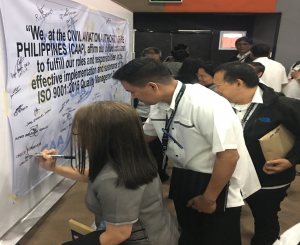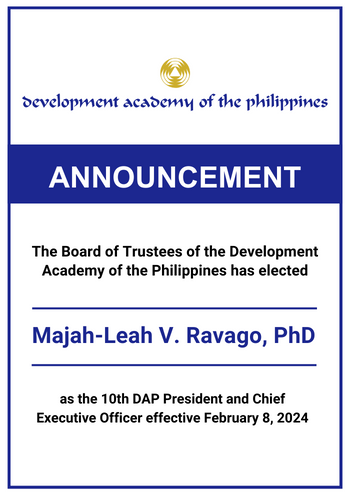
The Development Academy of the Philippines (DAP), through its Productivity and Development Center (PDC), held a half-day orientation on ISO 9001:2015 Quality Management System (QMS) for some 62 officials, staff and QMS core team of the Civil Aviation Authority of the Philippines (CAAP) last June 3 to discuss the importance, principles and requirement of the ISO 9001:2015 QMS standard.
CAAP Corporate Executive Director Captain Dante Langkit, delivered the opening remarks on behalf of CAAP Director General Jim Syjungco which stated “we must arrive at a common understanding of this pursuit for ISO certification. To us, it is our convincing and powerful testimony to the nobility of the CAAP vision.” He also mentioned that the CAAP is fortunate to be one of the 12 Government Quality Management Program (GQMP) beneficiary agencies on QMS consultancy services from the DAP. He recalled that as early 2015, the CAAP already had efforts on securing an ISO 9001:2015 certification, some activities and projects were started and, in 2018, a Quality Manual was completed through the efforts of its Strategic Planning Division.
“The QMS certification of CAAP will go a long way in contributing to the national competitiveness of the country,” said DAP Director Evangeline M. Macariola who served as the resource speaker. She also emphasized that ISO 9001 is a QMS that can be adopted by any kind of organization. As a system designed to constantly enhance agency performance, the adoption of ISO 9001:2015 Quality Management System can potentially improve the quality mindset/culture, avoid uncertainties in roles and responsibilities, eradicate malicious practices, identify and correct the inconsistencies in the implementation of processes, prevent erroneous outputs, apply risk-based thinking to avoid problems, and streamline inefficiencies and ineffectiveness of any organization with citizen satisfaction in mind. The premise, “Commitment to achieving citizen satisfaction is the key,” was underscored by Macariola, as she elaborated that the ISO 9001 necessitates risk-based planning, implementing the plan, monitoring, measuring and analyzing process performance–including satisfaction of customer and improving the plan. Certification to ISO 9001, which is conforming to requirements embodied in clauses: 4) context of the organization; 5) leadership; 6) planning; 7) support; 8) operations; 9) performance evaluations; and 10) improvement, has a three-year validity subject to certification, surveillance and re-certification audit.
DAP Project Manager Natasha V. Abaya highlighted that this orientation marks the commencement of the CAAP-QMS journey since it is the first activity of the project titled “Development of a QMS Certifiable to ISO 9001:2015 Standard for CAAP.” Thus, the project roadmap and the roles and responsibilities of the designated QMS Core Team towards successfully documenting, implementing, auditing, and reviewing the CAAP-QMS were also part of the proceedings.
The CAAP officials and personnel demonstrated their unwavering support to their QMS journey through the commitment exercise that capped the orientation. Their signatures on the commitment board shall serve as a symbolic reminder that everyone is willing to do his/her part in this great undertaking. – Angela C. Vargas




